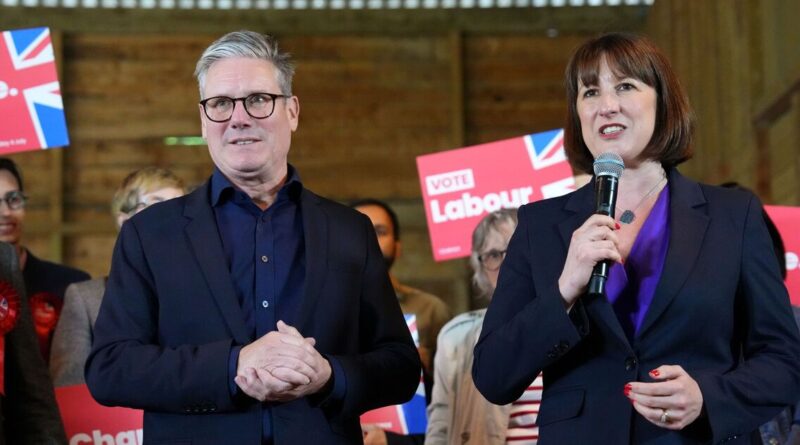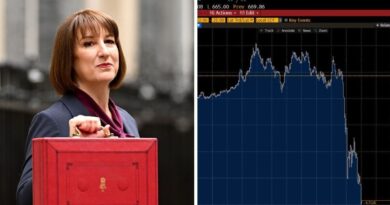Five pension, tax and savings conundrums that Labour’s Rachel Reeves faces | Personal Finance | Finance
Labour’s new Chancellor Rachel Reeves will face difficult decisions around five key priorities ranging from pensions to tax and savings.
The incoming Chancellor has listed economic growth as Labour’s over-riding aim on the basis it is central to providing the tax income to boost spending on public services, particularly the NHS.
However, the details of exactly how the new government will go about achieving this aim remain vague.
Director of public policy at AJ Bell, Tom Selby, said: “The party has been crystal clear throughout the campaign it will prioritise economic growth and ‘wealth creation’ in government, although details of exactly how these will be achieved, or what it might mean for people’s pensions and investments, have been relatively thin on the ground.”
Labour has pledged not to increase National Insurance, Income Tax or VAT, generating speculation about where extra income will be raised.
Mr Selby said: “If there is a vacuum for speculation about potential revenue raising tax measures, it is inevitable the prospect of a potential pension tax raid will rear its ugly head.
“Brits will be hoping the chancellor practices what she preaches when it comes to retirement policy by delivering at least some certainty over the next five years.”
AJ Bell has identified five key personal finance policy priorities –
Pensions
In the year 2000 UK pension funds and insurers held 39 percent of shares listed on the London Stock Exchange, but this had fallen to just 4 percent by 2020.
In the US, pension schemes hold 50 percent of their assets in equities, compared to 27 percent in the UK.
Mr Selby said: “A review of pensions has been promised, with the aim of improving outcomes and encouraging greater levels of investment in UK Plc.
“Clearly any shift in asset allocation by these schemes will need to be done in a way that doesn’t harm member interests, but given the amount of money sloshing around in defined benefit schemes in particular, even relatively small changes could make a sizeable difference to the UK economy.”
He said measures to encourage workers to invest more in their pensions are likely.
“Given people saving in a pension are often committing to lock their money up for decades, some stability in pensions policy, particularly around the tax rules and limits, would be welcome,” he said.
Savings
Labour has committed to simplifying investing in Individual Savings Accounts.
Mr Selby said: “As a first step, the next government should look at merging Cash and Stocks and Shares ISAs, the two main ISA products used by investors.
“This move would make it simpler for investors to shift between cash and investments and move us towards a world where investments are simply a feature of ISAs, rather than a defining characteristic.”
Investment advice
Making ISAs and pensions easy to understand is vital.
Mr Selby said: “Proposals to enable more personalised ‘Targeted Support’ guidance, has the potential to be a game-changer.
“More useful guidance, higher take-up of regulated advice and simpler products could provide the foundation for a saving and investing revolution in the UK.”
Lost pension pots
The new regime of automatic enrolment where employers are required to enlist employees in a pension scheme has been a success story.
However, Mr Selby said: “Those reforms require an upgrade to boost minimum contributions post-election, but there is also the mounting issue of ‘lost’ pension pots to tackle.
“Around £27 billion of retirement money is estimated to be ‘lost’ in the UK, in part because each job move can create a new auto-enrolment pension pot.
“Reforms to create pensions dashboards, which will allow people to see all their retirement pots in one place, should make a big difference.”
HMRC failures
The system around the tax that applies to withdrawals from pension pots remains faulty and needs to be fixed.
Mr Selby said: “The latest official figures reveal over £1.2 billion has now been repaid to savers who were overtaxed on their first withdrawal and filled out the relevant HMRC form to claim their money back.
“In the 2023/24 tax year alone, a record £198 million was repaid to people who had been clobbered with an unfair – and often unexpected – tax bill.
“It is simply unacceptable that the government has failed to adapt the tax system to cope with the fact Brits are able to access their pensions flexibly from age 55, instead persisting with an arcane approach that hits people with an unfair tax bill, often running into thousands of pounds, and requires them to fill in one of three forms if they want to get their money back within 30 days.
“The new government needs to urgently review this approach and deliver a solution that taxes withdrawals correctly.”





